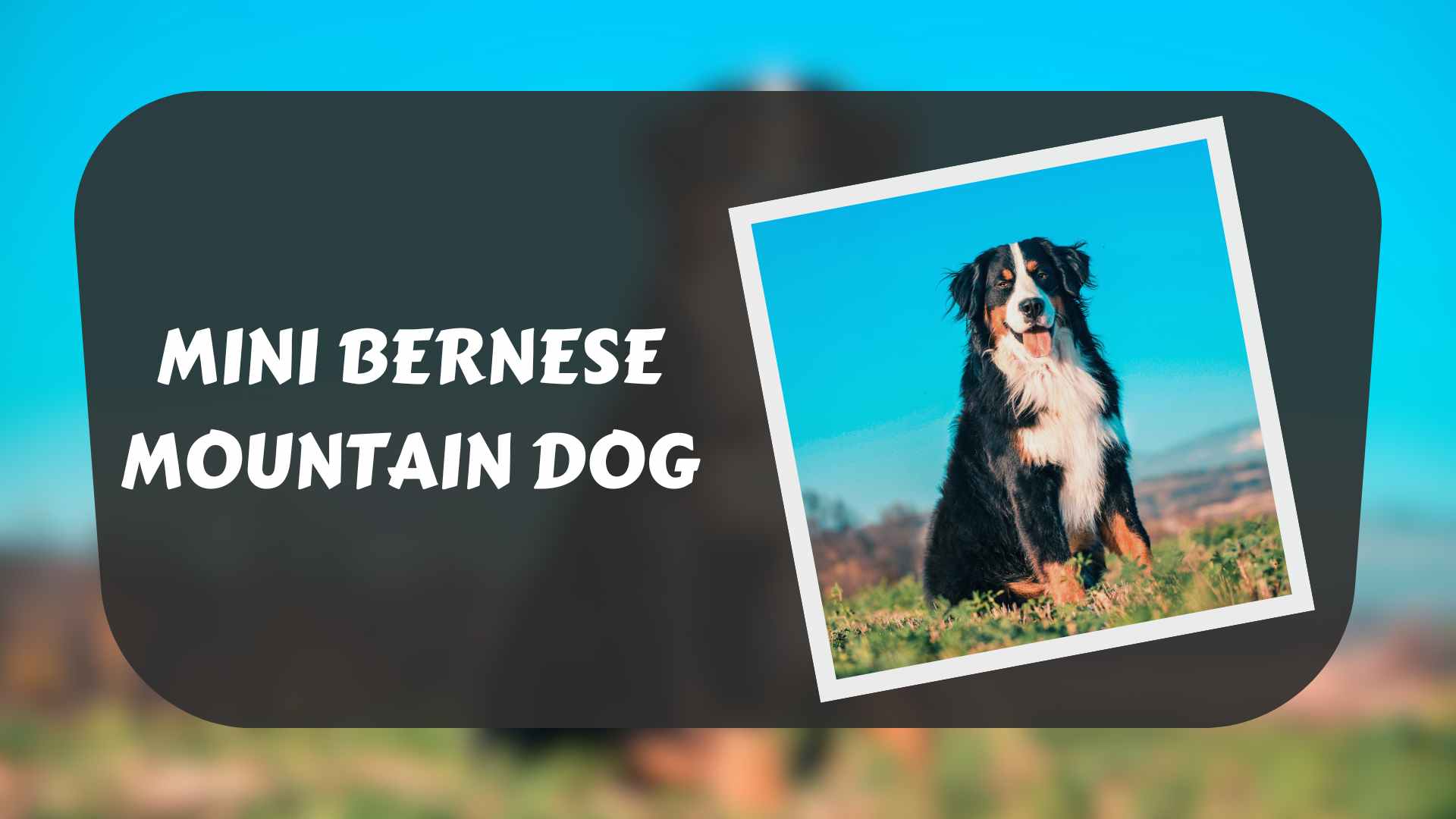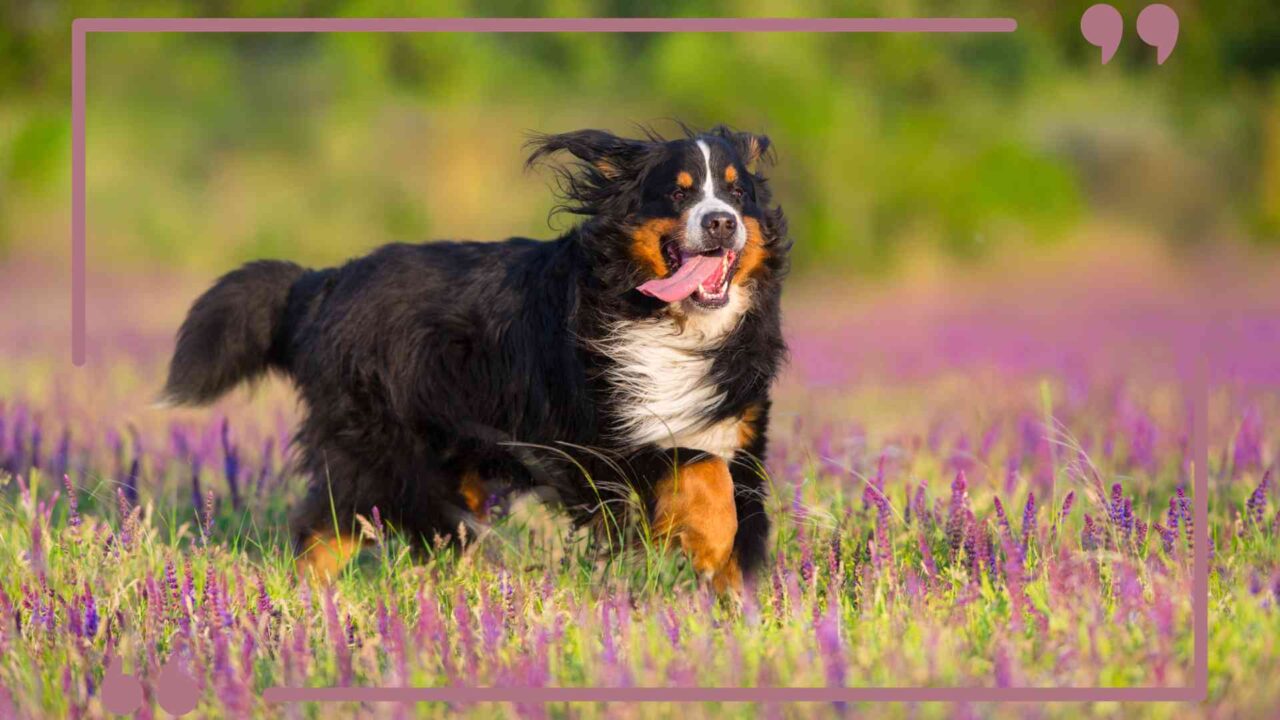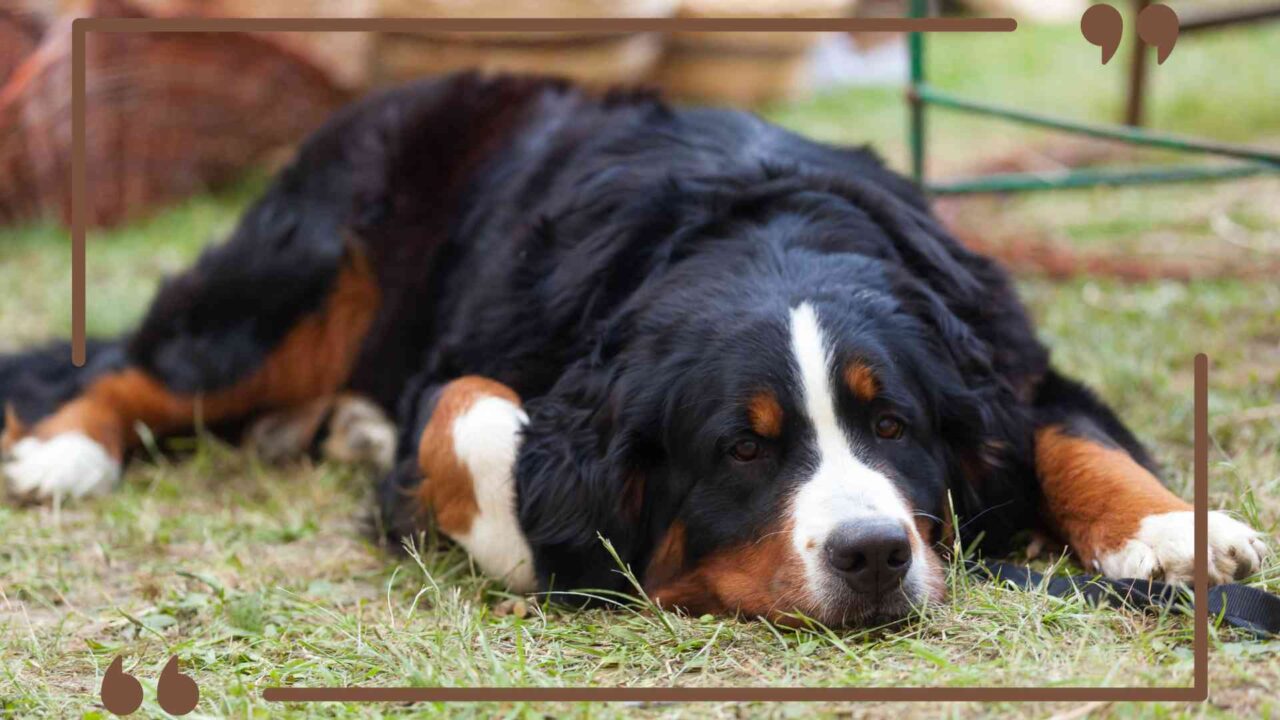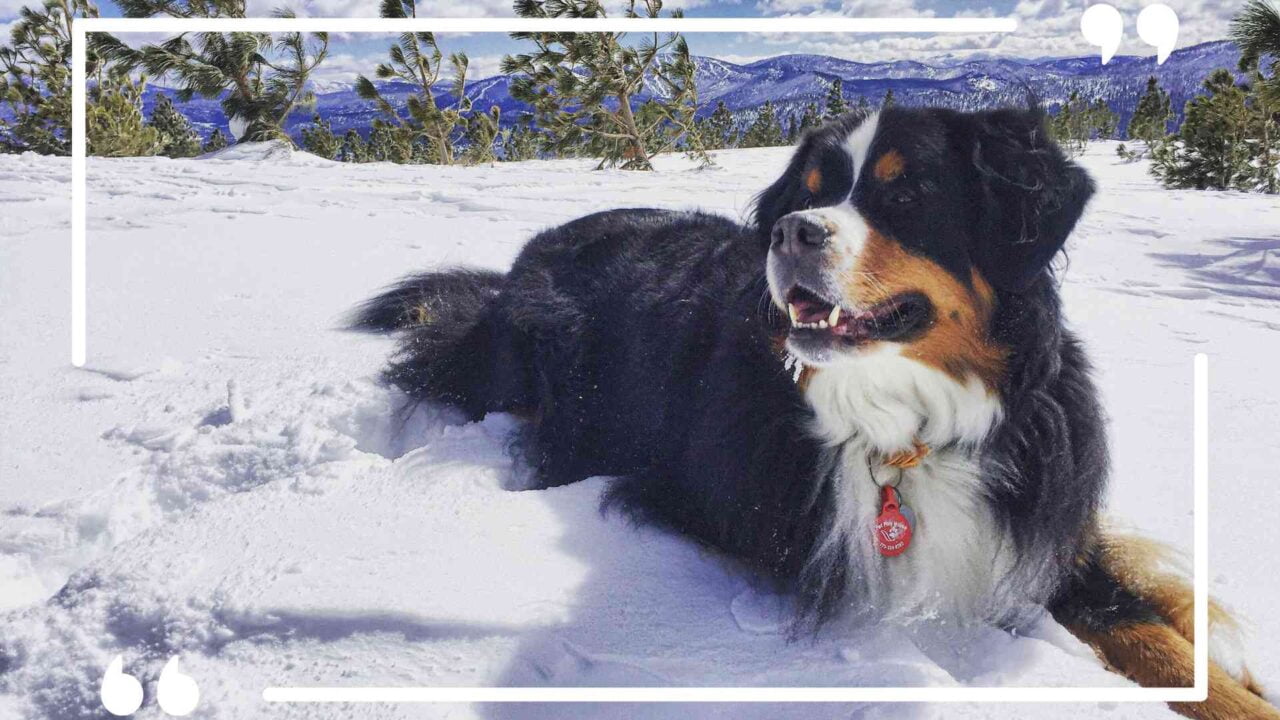Mini Bernese Mountain Dog : Your Perfect Mountain Companion

Are you fascinated by the beauty of Bernese Mountain Dogs but concerned about their large size? Meet the Mini Bernese Mountain Dog, a smaller variant that retains all the charm and characteristics of its bigger counterpart.
In this ultimate guide, we’ve gathered everything you need to know about this adorable breed – from its history and temperament to grooming needs and health issues. Let’s dive in and discover why these miniature companions are stealing hearts worldwide!
Disclaimer: This post content is for informational purposes only and should not be taken as professional advice. We highly recommend consulting with your veterinarian for any queries.
History And Characteristics Of Mini Bernese Mountain Dogs
Origin And Breed History
The Mini Bernese Mountain Dog comes from Switzerland. This dog is over 2000 years old. People used them as farm dogs long ago. They pulled carts and took care of animals. Swiss people love this breed because it can do many jobs and is very friendly.
Size And Physical Appearance
Mini Bernese Mountain Dogs are not too big. They only get up to 25 inches tall. They weigh less than 80lbs when they are fully grown. These dogs have broad chests and ears that hang down in a V-shape.
You can spot them by their lovely, thick coats of three colors.
Their eyes bring a kind feel to their grand look. The Bernese Mountain Dog breed has a unique body shape that sticks with the breed standard. It is known far and wide for its royal look.
Being small doesn’t take away from their charm at all!
Temperament And Personality Traits
Mini Bernese Mountain Dogs are full of joy and love. They enjoy being around people and show a lot of care to their owners. These dogs also get along well with kids, making them top picks for family pets.
Training them is simple as they are eager to please you. They love meeting new people and other pets, too. In short, these dogs bring lots of fun into any home they join!
Exercise And Activity Needs

Mini Bernese Mountain Dogs have moderate exercise and activity needs. As a herding breed, they require more exercise compared to other dogs. To keep them happy and healthy, they need at least 30 minutes to an hour of exercise every day.
This can include walks, playtime in the yard, or interactive games. Regular exercise is important because it helps prevent behavior problems like chewing or digging that may arise from boredom.
Since Mini Bernese Mountain Dogs have a larger build, regular exercise is crucial for maintaining a healthy weight. Aim for around 1 to 1.5 hours of exercise per day to ensure your Mini Bernese Mountain Dog stays fit and content!
Grooming Requirements
Grooming a Mini Bernese Mountain dog is an important part of their care. Their medium to long fur and thick double coat require moderate grooming. Regular brushing, at least once a week, will help keep their coat looking nice and prevent matting.
It’s vital to brush them daily during shedding season in the spring and fall. Nail maintenance is also essential, so make sure to trim their nails regularly. Overall, grooming should be done every 4-8 weeks to keep your Mini Bernese Mountain dog happy and healthy.
Nutrition And Feeding
Proper nutrition is essential for Mini Bernese Mountain Dogs to stay healthy. They can benefit from omega-3 fatty acids, such as DHA/EPA, which are found in some dog food or supplements.
It’s best to feed them a diet that includes natural and homemade foods like meat, grains, and fresh vegetables. While carbohydrates are not essential for dogs, those from plant-based sources have important functions in their bodies.
Bernese Mountain Dog owners choose different types of diets like raw food, homemade meals or commercially prepared kibble. Even though they’re smaller than regular Bernese Mountain Dogs, Mini Bernese still need the proper nutrition and care to keep them happy and healthy.
Training And Socialization
Training and socialization are crucial for Mini Bernese Mountain Dogs. These dogs need basic obedience training to learn commands and manners. Early socialization is vital to help them become comfortable around new people, animals, and environments.
By exposing them to different experiences, sounds, and situations in a positive way, you can prevent behavior issues like aggression or fearfulness later on. Taking your Mini Bernese Mountain Dog puppy to obedience classes and providing consistent training will help them navigate new experiences confidently.
Remember, proper training and socialization contribute to a well-behaved dog that can adapt well to various situations throughout their life.
Common Health Issues With Mini Bernese Mountain Dog

Gastric Dilatation Volvulus
Gastric dilatation volvulus (GDV), also known as bloat, is a severe and dangerous condition that can affect dogs, especially those with deep, narrow chests like the Bernese Mountain Dog.
It happens when the stomach becomes distended and rotates, causing potentially life-threatening complications. Common symptoms of bloat include pacing, difficulty walking, panting, discomfort, agitation, depression, drooling, and foaming at the mouth.
This condition can occur in dogs as young as 5 months old. Large and giant breed dogs are more prone to bloat due to their anatomy. If you notice any signs of bloat in your dog, it’s crucial to seek immediate veterinary attention to prevent further complications.
Syringomyelia
Syringomyelia is a condition where fluid-filled spaces develop in the spinal cord. Mini Bernese Mountain Dogs can be prone to syringomyelia and chiari-like malformation, which affect the brain and spinal cord.
Symptoms of syringomyelia in dogs include neck pain, stiffness, weakness in the hindlimbs, and abnormal sensations. This condition is relatively common in certain breeds like the Cavalier King Charles Spaniel and Griffon Bruxellois.
Cavaliers with syringomyelia have a reduced life expectancy, usually diagnosed between 6 months to 3 years old.
Hip Dysplasia
Hip dysplasia is a common health issue in Mini Bernese Mountain Dogs. It’s a hereditary condition that affects their hips. Signs of hip dysplasia may include pain during exercise, limping, and stiffness.
Some dogs with hip dysplasia may also have decreased activity and bunny hopping (both hind legs moving together). Treatment options include medication, weight management, physical therapy, and sometimes surgery for severe cases.
Elbow Dysplasia
Elbow dysplasia is a common health issue that affects Mini Bernese Mountain dogs. It can affect one to two-thirds of these dogs. This condition often happens because of a fragmented medial coronoid process, which causes malformation and degeneration in the dog’s elbow joints.
Elbow dysplasia is an inherited condition, meaning it can be passed down from parent dogs to their puppies. If left untreated, it can lead to arthritis and mobility problems for Mini Bernese Mountain dogs.
Degenerative Myelopathy
Degenerative Myelopathy is a disorder that affects dogs, including the Mini Bernese Mountain Dog. It’s a neurologic condition that can cause weakness and paralysis in the hind limbs.
This disease is associated with a mutation in the SOD1 gene. However, it’s important to note that Mini Bernese Mountain Dogs do not carry this specific mutation. Nevertheless, breeders should still be cautious when breeding Mini Bernese Mountain Dogs to ensure they are healthy and free from any potential genetic issues.
Degenerative Mitral Valve Disease (Leaky Valve Disease)
Degenerative Mitral Valve Disease, also known as Leaky Valve Disease, is a common heart condition that affects small to medium-sized dogs like Mini Bernese Mountain Dogs as they get older.
It happens when the mitral valve in the heart degenerates, causing it to leak and allow blood to flow backward. This can lead to symptoms such as coughing, difficulty breathing, and trouble exercising.
Around 30% of dogs over the age of 10 show signs of this disease.
Maintaining Good Health:
Regular Check-ups And Vaccinations
Regular check-ups and vaccinations are essential for keeping your Mini Bernese Mountain Dog healthy. By taking your dog to the veterinarian for regular check-ups, you can catch any health issues early on and ensure that they receive prompt treatment.
These check-ups also allow the vet to monitor your dog’s overall well-being and provide guidance on their specific needs.
Vaccinations are crucial in protecting your Mini Bernese Mountain Dog against various diseases. Core vaccines, such as rabies and distemper, are essential for every dog’s health. They help prevent serious illnesses that can be harmful or even fatal to your furry friend.
Additionally, there may be additional vaccinations recommended by your vet based on specific health conditions or lifestyle factors.
It’s essential to follow the recommended vaccination guidelines from reputable sources like the American Veterinary Medical Association (AVMA) or consult with a trusted veterinarian who is knowledgeable about Mini Bernese Mountain Dogs.
Proper Nutrition
A Mini Bernese Mountain Dog’s diet should consist of high-quality protein, healthy fats, vitamins, minerals, and fiber from vegetables and berries. It’s essential to avoid overfeeding and giving extra calcium supplements.
When feeding a Bernese Mountain Dog puppy, it’s crucial not to overfeed them. They should have a gradual growth rate of at most four pounds per week. As for adult dogs, many owners recommend high-quality food with low protein levels (around 18-26%) and moderate fat content.
Good nutrition is essential for keeping Mini Bernese Mountain Dogs healthy and happy!
Exercise And Mental Stimulation
To keep your Mini Bernese Mountain Dog happy and healthy, it’s crucial to provide them with regular exercise and mental stimulation. These dogs need at least 30 minutes to an hour of active exercise each day.
This can include activities like going for walks, playing fetch, or participating in dog sports. In addition to physical exercise, mental stimulation is also necessary for their well-being.
You can achieve this by giving them puzzle toys or engaging in training sessions that challenge their minds.
4 Interesting Facts About Mini Bernese Mountain Dogs
1. The Vibe Of Berners Is Similar To That Of Big Teddy Bears
Bernese mountain dogs, also known as “Berners,” have a vibe that’s similar to big teddy bears. They are gentle and friendly by nature, making them great companions for dog owners.
Just like snuggling up with a cozy teddy bear, spending time with Berners can bring warmth and happiness to your life.
2. Bernese Mountain Dogs Started Out As Farm Dogs
Originally, Bernese Mountain Dogs were farm dogs. They were bred in Switzerland for their size and strength to help with herding and transporting goods on farms. These dogs were hardworking and had the stamina to pull carts.
Even the Mini Bernese Mountain Dogs, which are smaller versions of the breed, were used for similar farm tasks. Despite their smaller size, they still possessed the same work ethic as their larger counterparts.
3. They Can Pick Up Hand Signals Easily And Respond To Them Effectively
Mini Bernese Mountain Dogs have a unique ability to understand and respond to hand signals quickly. Their high level of intelligence and trainability makes it effortless for them to pick up on these visual cues.
Hand signals provide clear and effective communication without the need for verbal commands, making training much easier and more efficient. Mini Bernese Mountain Dogs quickly adapt to these signals, showcasing their willingness to learn and their ability to understand their human companions.
With hand signals as part of their training repertoire, these dogs excel in obedience and can perform various tasks with precision and accuracy.
4. They Are Fond Of The Chilly Weather

Mini Bernese Mountain Dogs are known for their love of chilly weather. With their thick double coats, these dogs are built to thrive in cold temperatures. In fact, they can handle harsh winter conditions and even withstand temperatures as low as -28 degrees Celsius! Their strong tolerance for the cold makes them great companions for outdoor activities during the colder months.
While Mini Bernese Mountain Dogs are well-suited to cold weather, they may still require some extra warmth in extremely chilly conditions. A warm coat or sweater can help keep them comfortable during outdoor adventures.
So, if you live in an area with freezing temperatures, make sure to provide your furry friend with the necessary protection so they can continue enjoying their time outside while staying cozy and happy.
Frequently Asked Questions
Are Mini Bernese Mountain Dogs Good Pets?
Mini Bernese Mountain Dogs make wonderful pets! They are smaller in size and known for being friendly and outgoing, making them great companions. These dogs are patient and gentle with children, which makes them a perfect addition to any family.
Mini Bernese Mountain Dogs have a loving nature and enjoy spending time with their owners. They thrive on affection and attention, so they will always be by your side, ready for some cuddles or playtime.
Life Expectancy Of Mini Bernese Mountain Dogs
The life expectancy of a Mini Bernese Mountain Dog is usually between 13 and 15 years.
Do Mini Bernese Mountain Dogs Shed?
Mini Bernese Mountain Dogs do shed, but not as much as their larger counterparts. They have a two-layer coat that helps protect them from the cold weather, and this coat tends to shed.
However, with regular brushing and grooming, you can manage the shedding of your Mini Bernese Mountain Dog. It’s important to note that their thick fur may trigger allergies in some individuals, so if you or someone in your family has allergies, it’s something to consider.
Mini Bernese Mountain Dogs shed seasonally or cyclically, which means they may require extra grooming during these times to keep their shedding under control.
How Many Mini Bernese Mountain Dogs Are There In The World?
Mini Bernese Mountain Dogs are becoming increasingly popular, but it is difficult to determine precisely how many there are in the world. Since they are a relatively new breed and have yet to be recognized by major kennel clubs, there isn’t an official registry for Mini Bernese Mountain Dogs.
However, their popularity has been growing steadily, and more breeders are starting to produce them. The best way to find one is through reputable breeders or adoption agencies that specialize in smaller versions of the Bernese Mountain Dog.
So, while we don’t have an exact number, it’s safe to say that the Mini Bernese Mountain Dog community is expanding rapidly.
Are Mini Bernese Mountain Dogs Hypoallergenic?
No, Mini Bernese Mountain Dogs are not hypoallergenic. They have a two-layer coat that tends to shed, which can trigger allergies in some people. This shedding is due to their breed’s genetics and is not something that can be controlled or prevented.
If you have allergies or sensitivities to dog dander, it’s essential to consider this before getting a Mini Bernese Mountain Dog as a pet. Regular grooming and cleaning can help minimize the impact of shedding, but it won’t eliminate it completely.
Keep this in mind if you’re considering adding a Mini Bernese Mountain Dog to your family.
To Sum Up
Mini Bernese Mountain Dogs are smaller versions of the beloved Bernese Mountain Dog breed. They are affectionate, intelligent, and eager to please their owners. With a medium to large size and a life expectancy of 13-15 years, they can make excellent family pets for those looking for a loyal companion.




